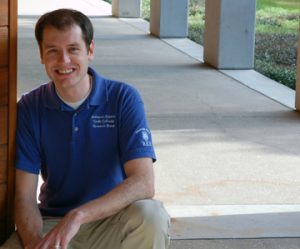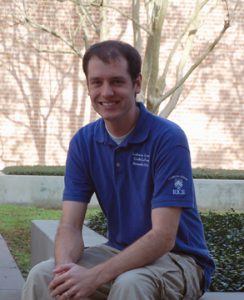 Sixth year Computer Science Ph.D. student Nick Vrvilo had only traveled outside of his home state of Oregon twice before he moved to Utah for college. “After growing up in the northwest and spending four years in Utah, I was looking for a more temperate climate for grad school, but I also wanted a place where I could focus on multicore software.”
Sixth year Computer Science Ph.D. student Nick Vrvilo had only traveled outside of his home state of Oregon twice before he moved to Utah for college. “After growing up in the northwest and spending four years in Utah, I was looking for a more temperate climate for grad school, but I also wanted a place where I could focus on multicore software.”
His undergraduate work was in verifying parallel software written in the message-passing model. “That work made me realize how the standard programming techniques for parallel computing were too complex and too error-prone,” he said. “I wanted to find a solution to the ‘multicore software’ problem.”
Vrvilo had heard of Rice when reading about the Wireless Open-Access Research Platform (WARP) for a software-defined radio project, and decided to look into Rice’s Computer Science department for grad school. “While most of the universities I researched had at most one professor that I might be interested in working with—which was difficult to determine since professors like to list ‘research interests’ rather than ‘what I have funding for right now’—I saw that Rice had at least three professors working in compilers and parallel computing.” Vrvilo was pleasantly surprised to see that Professor Vivek Sarkar (Vrvilo’s current advisor) actually used the term “multicore software” in the name of his research group!
Rice University also satisfied Vrvilo’s desire for a warmer climate. “I knew summers were going to be hot in Houston,” he said, “so I just planned to find research opportunities or internships in cooler places for those two or three months. Unfortunately, my first internship took me to a location even hotter than Houston.”
Vrvilo spent his first summer as a grad student in Taiwan as an NSF East Asia and Pacific Summer Institutes (EAPSI) fellow, where he collaborated on research with international colleagues. “I would definitely recommend that other CS students apply to the EAPSI program,” he said. “It is a unique opportunity for U.S. grad students to build new collaborations with peers at universities in Australia, China, Japan, New Zealand, Singapore, or Taiwan. It was an amazing experience, and I am still in touch with several of the American students I met there, even though many were from biology, social sciences, and other fields.”
He was very interested in returning to Taiwan, where he’d spent two years learning Mandarin Chinese as a missionary. “So EAPSI provided an opportunity for me to return to Taiwan, which is where my wife is from. Vivek had a contact that had just returned to the U.S. from Academica Sinica, Taiwan’s top research lab. He referred me to some colleagues, who I reached out to via email. Since EAPSI fellows are fully funded, I basically just asked if they were interested in having free work from an American grad student for a couple months over the summer. Dr. Chia-Lin Yang at National Taiwan University put me in touch with one of her grad students. He was interested in collaborating with me, and we created a research proposal for EAPSI. A couple of months later, I was accepted for the fellowship, and I spent eight weeks doing research in Taipei that summer.”
Vrvilo gained insight into how both research and graduate student programs work in Taiwan and urged more Rice CS grad students to apply for the NSF EAPSI fellowships if they are eligible. “There were not many CS grad students in the EAPSI program in Taiwan,” he said, “and I did not meet any women in CS who had applied for the EAPSI program that summer. I think the NSF wants good representation each year from both men and women across a variety of fields, which means CS applicants should have an additional edge.”
He also said his experience in Taiwan itself was wonderful. “The island is small and easy to travel, with lots of beautiful things to see and delicious new foods to try. You can circumnavigate the entire island by bike. The people are very friendly, and there’s always someone who is eager to practice their English when they spot an American—even if they only speak a few words!”
Because Vrvilo spoke Mandarin Chinese, it made his collaboration easier. But he also said the Chinese students all use English words for the technical terms, which made switching back and forth between the two languages interesting. “The other students in my lab spoke passable English, but they were very glad I spoke Chinese,” he said. “However, most of the other EAPSI fellows did not speak any Chinese, and each of them still had a fun and productive summer.”
Vrvilo also left Houston the following summers. “That is one thing I’d advise other graduate students to do,” he said.
Although leaving Rice for the summer may interrupt a graduate student’s own research and extend their program by another semester or year, Vrvilo feels the chance to explore a variety of work environments is more important.
 “Get out there and try different work environments so you begin to learn what you like and don’t like,” he said. “For me, working in a national lab felt similar to working in an academic environment but without two of the parts I loved best – teaching and leading a team of grad students.”
“Get out there and try different work environments so you begin to learn what you like and don’t like,” he said. “For me, working in a national lab felt similar to working in an academic environment but without two of the parts I loved best – teaching and leading a team of grad students.”
He interned twice with the same industry leader, and feels a little regret that he did not try two different companies instead. Vrvilo feels strongly that other grad students should seek out both industry and lab opportunities in the summer. He said, “Once you take a full time job, it is more difficult to change if you find you don’t like it. Plus, another added benefit to the summer work is that it may lead to job offers. One of my Rice PhD friends interned twice at Google. That gave him an easy-in there for a full-time position after he graduated.”
Although he’s explored both research and industry roles, Vrvilo has also developed an affinity for teaching. He said, “I just like to learn and I like to help other people understand and learn new and interesting things. I like gaining knowledge, pursuing it, and disseminating it. And you don’t need to find an internship to try out teaching. Grad school IS your internship to find out if academia is for you.”
Nick Vrvilo completed his Ph.D. in CS in 2017. His adviser was Vivek Sarkar.
